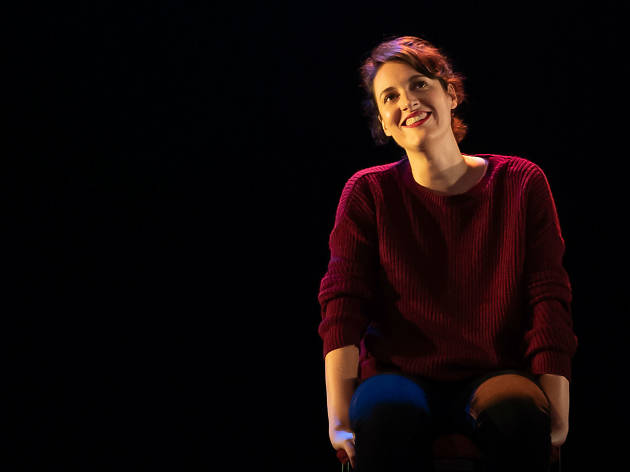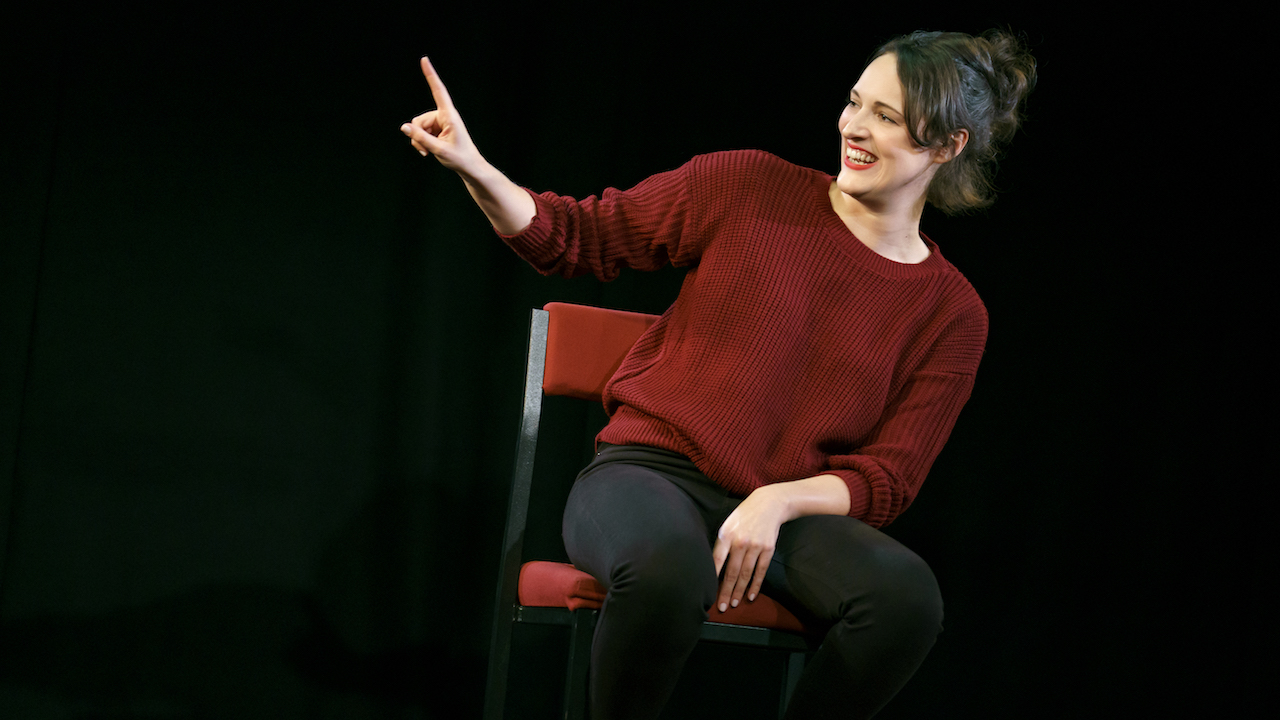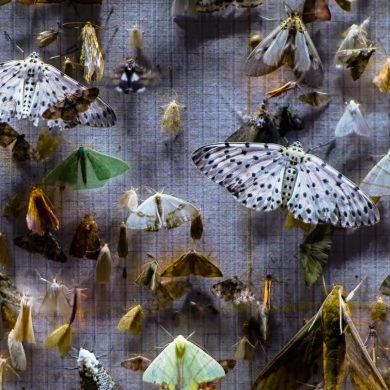Phoebe Waller-Bridge is having, what they call in the entertainment industry, ‘a moment’. Having just won a bucket load of Emmy’s for the second season of Fleabag (trumping expected winner Julia Louise Dreyfuss and Veep for the big prize), and being hired to pep up the script for the new Bond film, Waller-Bridge has become a household name. She has become somebody.
As a way of crossing the divide between her stage roots and her new found cinematic life, Waller-Bridge has embarked upon a short, intimate final run tour of her hugely successful stage play, Fleabag. Thanks to National Theatre Live, people around the world are able to catch this profoundly brilliant piece of live theatre at limited run screenings. And gosh, I’m grateful that we have been afforded this opportunity, because this is one of the most exciting, entertaining, and human pieces of modern theatre I’ve seen.
Fleabag follows the titular Fleabag (Waller-Bridge) as she struggles through life, trying to find her feet after the death of her best friend and business partner, Boo. The two ran a guinea pig themed café, and with Boo gone, the vibrancy and life of the café has left with her. We meet Fleabag as she is in a meeting with a bank officer, trying to secure a loan to help keep the business afloat. But, as this is a one person play, we hear the meeting take place via a disembodied voice, ethereally surrounding the audience like a voice of God.
For those who have seen the TV series, the narrative beats will be familiar, with many of the iconic moments being presented in a skewed manner. The public transport encounter with the small mouthed rodent man is told in a hilarious fashion, with Waller-Bridge puckering her mouth to depict the mawkish man in all his glory. Having seen the series, it’s easy to visualise Jamie Demetriou with obnoxiously oversized teeth attempting to hit on Fleabag, but it’s not essential to have watched the show before seeing this stage performance. If anything, this one person show displays the breadth of Waller-Bridge’s talents completely – her writing, her characterisation, her timing, all working together to show someone who is so deeply aware of how to use every aspect of the theatre to honour this story perfectly.
While this is the end of the theatrical run of Fleabag for Waller-Bridge, it also feels like the end of Fleabag as a whole. It’s hard to imagine anyone being confident enough to perform Waller-Bridge’s play themselves, as the character of Fleabag feels so intimately entwined to Waller-Bridge herself. To have someone else play her would feel false and like a hollow imitation.
It’s here that a comparison between Hannah Gadsby’s Nanette and Fleabag feels apt. Sure, Fleabag is a one person show, a monologue, but it feels no different to the bare, open stand-up comedy of Gadsby’s show. Phoebe Waller-Bridge sits for the duration of the show, almost as if it is a silent announcement that this is not a stand-up comedy routine, it is theatre. But, just like Nanette, there is new ground being forged here in the realm of comedy. Fleabag is an honest, open character. She’s complex in ways that we have rarely seen explored in comedy.
What makes Fleabag such a brilliant piece of modern literature is the way that comedy is weaved into the narrative with ease. Psychoanalysts would no doubt say that Fleabag is deflecting her problems with the use of comedy, but don’t we all do that already? I loathe to bring up Todd Phillips in this review, especially given the hubbub about his film will wither and die like an untended houseplant, but his ‘woe is me’ obnoxious blather about being ‘forced’ away from comedy because it’s become ‘too woke’ is exposed for the bullshit that it is with Waller-Bridges guilty feminist character. At one point, she makes a joke about how lucky her sister is to have a husband who would want to hit her, and you feel the audience recoil at her jealousy. Fleabag responds with a raised eyebrow and a ‘really?’, as if she’s asking the audience to realise that they haven’t been paying attention. She doesn’t want to be beaten, she merely wants to be with someone who feels they own her. This is the darkest the comedy gets, but also the most open.
The confessional tone to the play exposes the character of Fleabag as equally as it exposes our own prejudices, foibles, and intricacies. Part of the allure of Fleabag is that she feels just like us. There’s a simmering pain to Fleabag, and Waller-Bridge embodies this with knowing and understanding. Through Fleabag, we witness the yearning to be desired, the yearning to be needed and wanted by someone else.


It’s easy to depict this desire as very surface level and safe, possibly through an adult-realised version of the teen diary full of love hearts and hope. But, that’s not reality, and it’s most certainly not who the character of Fleabag is. Her desires are deeply sexual and at the core of who she is, and it’s this deeply personal desire feel all the more relatable. It’s odd that way – specificity encourages relatability.
That yearning to be desired is realised in unison with an exploration of loneliness. The hope that when someone is masturbating, that it’s you that they’re thinking of, feels so immediately perverse, but it’s a feeling that many of us have. The want and desire to be the first thing in someone’s mind when they are at the moment of sexual ecstasy. Sure, the desire to be the first thing on someone’s mind when they wake up is there too, but the way Waller-Bridge writes the act of masturbation, the act of taking a nude photo for a lover, the act of sex itself, is so much more than being basal sexual actions.
The way that masturbation is talked about here feels like an excoriating act to strip away the mental image of the lone man, furiously masturbating like a sweat covered brute. The subject of masturbation has been such a masculine focused act in media, that it becomes welcome and appreciated to hear it explored from a feminine perspective. If anything, the monotony of masturbation is exposed in a way that is hasn’t been exposed before. Fleabag masturbates to pass the time, she masturbates when she’s bored, she masturbates when she’s aroused, she masturbates to speeches of Barack Obama, to thoughts of Zac Efron. In one sequence, Fleabag rattles off an extensive list of porn terminology, each new one exposing the tedium of pleasure, where to gain pleasure, one has to gradually move to more extreme aspects of porn.
And yet, that long list works to expose the loneliness that Fleabag sits in day in, day out. Even with her sometimes boyfriend, Harry, flitting in and out of her life when she needs, Fleabag feels incomplete, afloat in a miasma of uncertainty. And maybe this is why Fleabag resonates so strongly – that loneliness can hit in unexpected ways. Just like the death of Boo, who merely wanted to be lightly maimed to get back at her boyfriend, loneliness can slam into you, knocking you from a bicycle, to a car, to another car, overturning your life and devastating everything.
Fostering that loneliness is the desire to know that you’re not weird, that you’re not mad or crazy or perverse for thinking the thoughts that you think. We’re so conditioned to not verbalising our quirks and absurdities that we can’t help but walk through life thinking that we’re the only ones with these thoughts. The presence of Phoebe Waller-Bridge, sitting on stage by herself as the character of Fleabag, makes these thoughts feel familiar and relatable. And yet, my own prejudice is exposed through this presentation, where given the weirdness, the isolation, the oddity of the character of Fleabag, I find it hard to not feel sceptical at the way that she has been embraced so completely.
But, that goes against the entire ethos of Fleabag. She wants to know that she’s not alone in these thoughts, and with her comedy, each laugh that you can’t help but release ensures that she’s not alone. You want to comfort her, to be there for her, but as the last line of the play shows completely (‘fuck off’), this is not what Fleabag wants at all.
Fleabag is an exploration of the bonds that exist within our lives – the strangers we meet on public transport, the sister we barely see, the parent we’ve become estranged from, the best friend who we lose, the pet that we love that will inevitably die. It’s easy to see yourself as Fleabag, because we know what it means to be alone in the middle of the night, wishing that someone was there to hold you.
We meet Joe, a man who visits the guinea pig café every day, wanting company, familiarity, and the comfort that the routine of visiting the same café every day brings. When Fleabag exposes herself, literally, to Joe, hoping for that comfort that he gets from the café to be transferred to her, he is taken aback and ashamed. This is not the kind of salve for loneliness that he desires, showing that that reprieve comes differently for everyone else. Again, the specificity of Fleabag’s loneliness makes it all the more relatable.
The obvious difference between the TV series and the stage play is immediate – instead of Fleabag being surrounded by actual people playing the characters she’s talking about, they’re presented as disembodied voices talking to her. This makes the isolation even starker than it is in the TV show – she is engaging with a world around her, but there is nobody there. Even when she’s sitting beside her sister, in an auditorium full of 400 people, it is just Fleabag. Never before has the reality of feeling alone in a crowd been so perfectly, so devastatingly, so heartbreakingly realised.
I’m labouring on the depressing aspects of Fleabag because we already know how astounding the comedy is. This is, quite simply, one of the finest modern comedies in existence. Phoebe Waller-Bridge deserves every accolade that she receives. This stage based version of Fleabag is both the same, and different, as the TV version. Just like that TV version, it’s essential viewing. The differences between the two – the one person play aspect in particular – make this a complimentary experience, working to inform the TV version in the same way that the TV version compliments the stage bound version. You’ll do well to treat yourself to this wondrous experience.
Director: Vicky Jones
Cast: Phoebe Waller-Bridge
Writer: Phoebe Waller-Bridge




